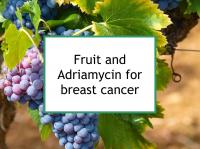The current webpage is designed to make additional research available concerning how certain fruits can enhance the treatment effects of doxorubicin. These are fruits with significant levels of compounds that act as doxorubicin sensitizers or protect against doxorubicin-induced toxic side effects. At the bottom of this webpage are links to studies relating to the beneficial fruits in Foods to eat and avoid during doxorubicin.
The following fruits or their extracts have been tested and found specifically to enhance the treatment effects of doxorubicin and/or protect normal tissues (but not tumors) from doxorubicin-induced cardiomyopathy and other toxic side effects:
Fruit consumption heightens the cytotoxic effects of doxorubicin on breast cancer cells or protects from its toxic side effects mainly through the actions of various phytonutrients, among them:
- Anthocyanins (found, for example, in blackberries, boysenberries, passion fruit and plums)
- Beta-carotene (apricots, cantaloupe, mangoes)
- Ellagic acid (blackberries, muscadine grapes, raspberries)
- Fisetin (apples, kiwifruit, strawberries)
- Lupeol (red grapes, mangoes)
- Myricetin (black currants)
- Phloretin (apples)
- Pterostilbene (blueberries & bilberries, grapes - especially black or red)
- Quercetin (black currants, raspberries)
- Resveratrol (blueberries & bilberries, red grapes, red currants)
- Ursolic acid ( apples - especially the peel), cherries - especially sour or tart, plums & prunes)
- Vitamin C (currants, kiwifruit, strawberries)
as well as the hormone melatonin (cherries, especially sour or tart).
Please read the applicable food webpages when making your own food lists since these pages contain important advice, food rankings (e.g., highly recommended, recommended in moderation), consumption limits, and other pertinent information.
Fruit phytonutrients should be obtained by eating whole fruit rather than taking supplements. When a beneficial nutrient is administered at low doses by consuming food, it is likely to have subtle chemopreventive effects, whereas the same compound administered at high doses is more likely to have pharmacological effects, with possible unwanted outcomes. For example, resveratrol has been reported to promote proliferation of ER+/PR+ cells under some circumstances. In fact, while resveratrol has been shown to reduce ER+ cell growth at the earlier stages of cancer development, it can promote ER+ proliferation during later stages.
